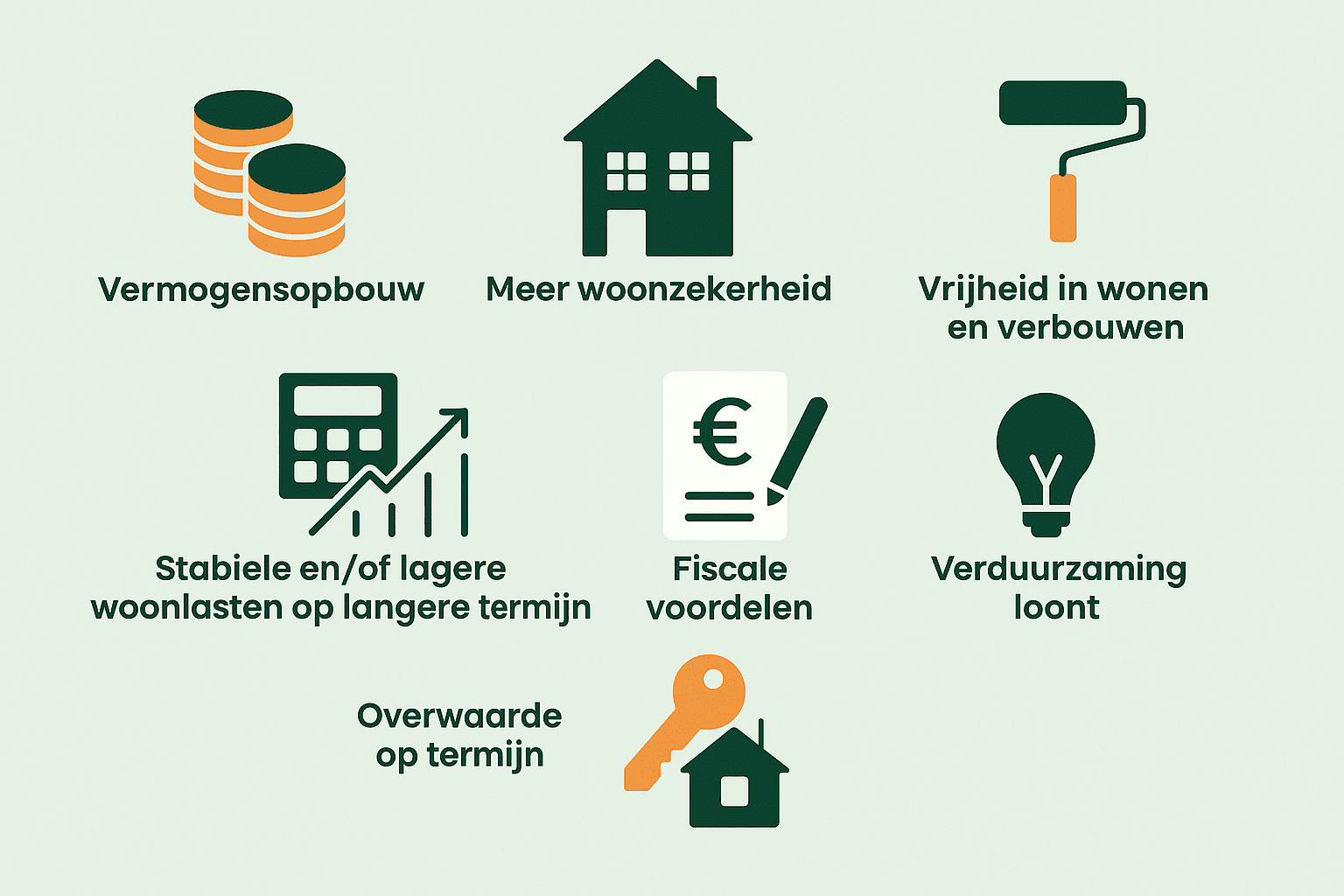Step 5: Additional research before making an offer
After visiting several homes, you might feel ready to make an offer. But don't rush yet. You have to dig deeper before making an offer.
As a buyer, you have a duty to investigate (onderzoeksplicht). This means you are responsible for checking the condition of the home and if there are any defects or risks.
The seller has a duty to disclose (mededelingsplicht). This means that the seller has to inform you about known defects, issues, and risks. Making an offer without proper investigation is like buying blind. It might work out fine, but it could also lead to extra costs.
Everything you could have discovered beforehand is your own problem. You can't hold the seller responsible for these later discoveries.
What does buyer's due diligence include?
You should actively look for:
- Visible defects, such as cracks, moisture, mold, or wood rot.
- Legal limitations, such as leasehold (erfpacht) or specific clauses.
- Energy of insulation problems.
- Deferred maintenance: This is mostly important when you want to buy an apartment.
- Restrictions related to monument status, zoning plans, or soil contamination.
Did you do minimum to no research? Have you discovered something after purchasing, but could you have found this before? Then you are responsible. You may not hold the seller legally responsible.
SIGHTLY combined a trained real estate agent with AI technology. This allows us to detect visible defects, hidden issues, and potential risks. It's more extensive research.
What is the seller obligated to disclose?
The seller must inform you of:
- Known defects, such as leaks, mold, or subsidence.
- Any non-visible issues they are aware of, such as outdated electricity.
- Prior use of the property. Was it a rental before? Did they inherit it?
If they fail to disclose something they knew, you may have legal grounds to cancel the sale or claim compensation. However, this is a complex process that everybody wants to avoid.
Do you need a structural survey (bouwkundige keuring)?
A structural survey is an inspection of the home by a certified building expert. It's more elaborate than a regular viewing.
This survey includes:
- A list of visible defects.
- An estimate of repair costs.
- What future maintenance expenses you can expect.
When is a structural survey necessary?
- For older homes (built before 1990).
- If you have doubts about the current condition.
- If you want to add a "subject to inspection" clause to your contract.
You can do the inspection before or after making the offer. Doing it before the offer gives you stronger negotiation power. If there are many issues, you make a strong case why you offer a certain amount.
Doing it after making an offer can be because you want to include a resolutive condition in the contract. These conditions offer a way out of the purchase if certain things are wrong or not up to standard.
For example: You state in the conditions that the deal can be canceled if repair costs exceed €10,000. If this is the case, you can cancel the purchase agreement for free.
Common legal clauses you may encouter
- Old property clause (ouderdomsclausule).
- Non-occupancy clause (niet-zelfbewoningsclausule).
- "As is, where is" clause.
Old property clause (ouderdomsclausule)
With this clause, you accept that the property may have outdated materials or construction techniques. This is particularly the case with houses older than 30 years. You accept the risk. You cannot hold the seller accountable afterward.
Non-occupancy clause (niet-zelfbewoningsclausule)
This clause indicates that the seller has not lived in the home themselves, so they do not know much about it. This might be the case when they inherit the home or when it was a rental before. The person doesn't know much or anything about the state.
Caution: This clause is particularly risky. Make sure you do your buyer's due diligence. After the purchase, you are responsible for everything you come across.
"As is, where is" clause
The home is sold as it is, including all the visible and invisible defects. The seller must disclose known issues. Homes like these are also older. They are mostly fixer-uppers. With this clause, the seller wants to protect themselves from possible issues that arise during the renovation.
Caution: Be careful with buying a home with this clause. Maybe there aren't many issues. But in the worst case, you might come across a lot of damage, mold, or outdated material. This can lead to higher costs than expected.
Energy label and sustainability
The seller must provide a valid energy label, indicating how energy efficient the house is.
- A++++ is the most efficient.
- G is the most inefficient. You can expect high energy costs.
We recommend you pay attention to:
- Insulation: roof, walls, and floors.
- Type of glass: single, double, or HR++.
- Heating systems: boiler or heat pump.
- Ventilation quality in the kitchen, bathroom, and toilet.
- Recent energy bills.
Single glass makes it difficult to heat up the house. Double or triple, or HR++ glass is way more efficient. It takes less to heat everything up or cool it down. If someone has an older boiler, it might work less efficiently.
Tip: Some banks offer lower interest rates for homes with an energy label of B or higher.
Buying an apartment? Check the Homeowners Association (VvE)
When buying an apartment, you automatically become a member of the Vereniging van Eigenaren (VvE). This association manages the building and shared costs.
We recommend you request the following:
- Deed of division (splitsingsakte). This states which parts are joint, what is private property, and what the voting rights are.
- House rules.
- Latest annual report.
- Multiple-year maintenance plan (MJOP).
These are important questions to ask?
- Is the VvE financially healthy?
- Is there enough in the reserve fund?
- Are there major works planned?
- What is the monthly VvE fee?
Buying a listed property?
If a house is a national or municipal monument, certain rules apply:
- You may need special permits for renovations.
- Maintenance can be more complex and expensive. They might use specific materials or techniques.
- Some subsidies may be available for restoration.
Other things to check before making an offer
- Zoning plan: Are you allowed to extend or renovate?
- Soil contamination: Ask for a soil report if you are unsure.
- Leasehold (erfpacht): Is the land owned or leased? What are the annual costs, or has it been paid off already?
- Legal conflicts: Are there any disputes with neighbors or the municipality?
Tip: You can request this information from the selling agent, your purchasing agent, or directly from the municipality.
Step 6: Negotiating and placing a bid
You have found a home that fits your needs, and you have done your research. Now it's time for the most exciting and nerve-racking part: making an offer.
Bidding is not just "how much are we going to pay?". It's a strategic thing that involves emotions, legal conditions, and financial plans.
What do you discuss during the biddingprocess?
When making an offer, you discuss the following components:
| Item | What it means |
| Purchase price | What amount do you offer for the property? |
| Transfer date | When do you want to get the keys? |
|
List of movable items | Which items will remain, what will be removed and will be taken over for x amount. |
| Resolutive conditions | Under which conditions are you allowed to cancel the purchase without a penalty? |
| Financing reservation | How much time do you need to finalize the mortgage? |
How do you determine your offer strategy?
Do market research:
- Compare the house to recently sold properties in the same area.
- Check how long similar homes stayed on the market.
- Ask your buying agent for a professional valuation.
Choose your bidding style:
- Fixed offer (no negotiation): Best for high-demand homes.
- Leave room for negotiation: This is the best strategy when a home has been listed for a while.
- Emotional angle: Include a personal letter to win over the seller.
Tips:
- Never offer more than your financial limit.
- Be aware of extra costs, such as notary fees, renovation, and buyer's costs (kosten koper).
- Do you have to overbid a lot? Make sure to do a structural survey beforehand.
Movable property: What remains?
Movable items (roerende zaken in Dutch) are items that aren't fixed to the house. They can be moved without causing damage to the property.
Movable items are:
- Curtains.
- Flooring.
- Lighting.
- Fencing.
- Freestanding kitchen appliances.
Note: A list of movable property will be included in the purchase agreement. This list specifies what stays, what will be removed, and what can be taken over.
Resolutive conditions (ontbindende voorwaarden)
Resolutive conditions give you the legal right to cancel the purchase free of charge.
Common conditions inclue:
- Financing condition.
- Structural inspection condition.
- NHG condition.
- Housing permit condition.
Financing condition
If your mortgage is not approved within the agreed time, mostly between 4 and 6 weeks, you can cancel the deal.
Structural inspection condition
If a building inspection reveals defects exceeding a certain amount, you can renegotiate or cancel the purchase. This amount must be specified in the contract.
NHG condition
If your mortgage depends on receiving the National Mortgage Guarantee, and it's denied, you can cancel it.
Housing permit condition
Some municipalities require a permit to buy specific types of homes. If you are denied this, the sale can be made undone.
Note: If you don't include resolutive conditions, you will be legally and financially responsible for any problems that arise later.
What happens after your offer is accepted?
- The seller confirms in writing that he agrees.
- The preliminary purchase agreement will be prepared.
- After signing the agreement, you have a 3-day statutory cooling-off period. After this, the purchase becomes legally binding, unless one of the resolutive conditions applies.
Note: In the Netherlands we have a requirement of written agreement (schriftelijkheidsvereiste). This agreement states that verbal agreements are not legally binding. It becomes official after both parties sign the written agreement.
Tips for negotiation
- Do not let yourself be pressured. The seller's agent might try to rush you, telling you how many people have made an offer yet. But this is a tactic to create urgency.
- Know when to walk away. There will be other houses.
- Use your buyer's agent to strengthen your negotiation position.


